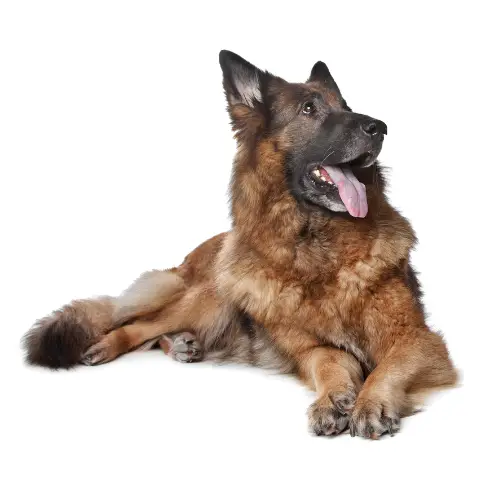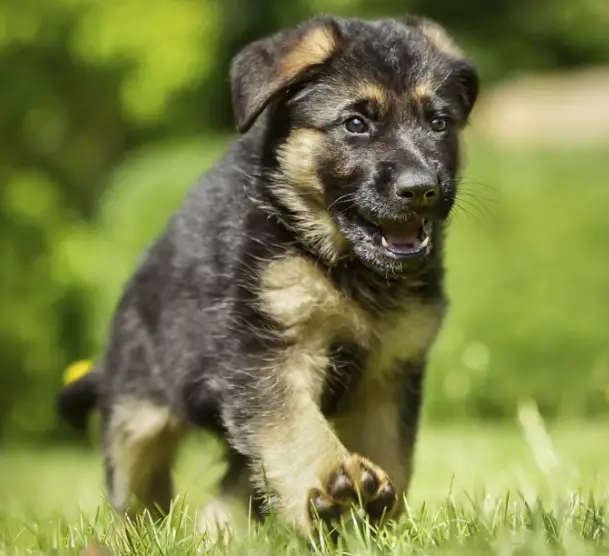A German Shepherd that is three months old is still fluffy and adorable, but it has undergone significant development since its early months. It has grown to be approximately a foot tall, has lengthy paws, and has a strong desire to gnaw anything. Put all of your socks, shoes, and clothing away because their fangs could cause serious damage to them. Instead, spend your money on amusing chew toys and reserve all of your patience. Your puppy needs proper care, and you must manage its high level of energy.
The enthusiasm of your small puppy is very astounding. To ensure a happy and healthy future for your German Shepherd, you must learn how to train them. This manual will assist you in learning more and enabling your ideal dog to lead a long life filled with adventures and fulfilling experiences.
What Is The Physical Development Of A 3-Month-Old German Shepherd?
They are nearly a foot tall and are growing quickly in the third month. Males will range in height from 9 to 11 inches. Females follow closely behind, standing between 8 and 10 inches tall.
Males now weigh between 22 and 30 pounds, showing that they have gained a few pounds. Females weigh between 17 and 26 pounds, which is a few pounds less than males.
At 12 weeks, there will be some significant changes. They will start the teething process because they have grown out of their puppy teeth. As their adult teeth take the place of their baby teeth, this will last for several months.
Their puppy coat will be another noticeable alteration. Their puppy fuzz will start to disappear about this time when their adult hair begins to sprout. An indication that their coat is changing is a racing stripe on the spine.
What Are The Behavioral Changes Of A 3-Month-Old German Shepherd?
Your puppy’s neonatal stage ends at the age of three months, and it formally enters the juvenile stage. It lasts for the first six months of your puppy’s life and is characterized by tremendous activity, curiosity, and occasional mischief. Because of this, socialization and education are crucial throughout this time.
At this stage, German Shepherd puppies are highly active. Even if they appear to be more mature than ever, their puppy nature usually leads to mischief, so you must be as patient as you can when teaching your child appropriate behavior.
Your dog might lunge and bite people. So teach it to grasp “no” as quickly as you can. If it can resist doing that, reward it with a treat.
Your German Shepherd puppy needs a lot of exercises because it is so energetic at 3 months old. Keep it occupied all the time, but avoid making it work hard for an extended period of time because this could be quite harmful to its health. As frequently as you can, take it on walks. A 15-minute stroll will do. Your dog can travel up to 6 miles (9.5 km) every day on foot. However, don’t force it to travel this distance all at once.
What To Feed A 3-Month-Old German Shepherd
It’s critical to choose food that will meet all of a growing puppy’s nutritional needs in order to ensure optimum development and health.
Experts advise feeding your 3-month-old German Shepherd 2 cups of premium dog chow each day to keep his diet varied and interesting.
The food can be split up into multiple smaller meals during the day.
Your German Shepherd puppy needs a diet rich in protein, carbs, and fat for the first three months in order to develop muscular development.
Make sure that 25% of the calories your dog consumes come from sources of protein, such as soy products, eggs, meat, poultry, and fish. Puppies adore cheese and yogurt, which are also excellent sources of protein.
Additionally, confirm that the food you select has an adequate amount of calcium. It is necessary for the robust bones and teeth of your German Shepherd puppy.
3-Month-Old German Shepherd Health Issues
It’s crucial to monitor the health of your German Shepherd puppy who is three months old. At this age, your German Shepherd puppy should have received rabies, distemper, and parvovirus vaccinations.
The best course of action would be for you to begin monthly deworming him as well. A change in his appetite or level of energy may indicate an illness, so keep an eye out for them.
One of the most prevalent medical disorders in dogs is allergies, and German Shepherds are not an exception.
Your German Shepherd puppy may have allergies if you notice him scratching frequently, having red, itchy skin, or losing hair.
Due to their great size and quick growth, German Shepherds frequently experience joint problems. If your dog has joint issues, he will likely be limping or acting as though he is in pain.
Large breeds like German Shepherds are more likely to develop panosteitis, a disorder that affects the long bones in the legs. Lameness, discomfort, and stiffness are some of the symptoms.
Take your puppy to the vet for a checkup if you suspect any potential health issues.
Most puppies may overcome these health issues and enjoy happy, healthy lives with the right care and treatment.
How Much Exercise Does A 3-Month-Old German Shepherd Need?
German shepherd puppies under three months of age require roughly 30 minutes of daily activity. This can include both muscle training—like playing with a rubber Kong toy—and aerobic exercise, like walking or playing fetch. German Shepherd puppies require a lot of activity to develop into healthy, robust dogs. Too much or too little can result in issues later on.
To give your German shepherd puppy more exercise, you can also take them for drives. Just be sure you stop often enough for them to go potty.
A young puppy should not be over-exercised as this can result in joint issues in the future. Instead, concentrate on offering numerous opportunities for exercise throughout the day. This will stimulate rather than exhaust your German shepherd puppy.
Walking is my preferred form of exercise for a GSD that is three months old. We benefit from it, and I like spending time with my dog.
Conclusion
German Shepherd puppies under three months old are bundles of energy, yet they can also be placid when necessary. Knowing how to train them and ensure that they grow up to be healthy and happy dogs is crucial in light of this. This article will discuss what you should do to ensure your dog has a long and fulfilling life during the first three months they are with you.
German shepherd puppies that are three months old are starting to become more aware of their surroundings. They will start to comprehend what is going on around them and develop their social skills with both humans and other animals. This implies that starting now is more crucial than ever.







